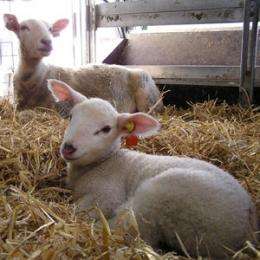The ewe can mitigate adverse experiences in her lambs

Lambs are likely to encounter a number of adverse events, starting from the fetal stage. In rodents and humans, it was shown that the mother can mitigate the effects of adverse experiences in her young.
Sophie Hild’s doctoral research shows that in sheep, the dam can also to some extent alleviate the effects of adverse events on the behaviour and physiology of her lambs.
The mother-young relationship in sheep is of utmost importance for the development of the young and their survival and well-being. Despite substantial knowledge on the mother-young relationship in sheep and how it is related to the survival of the lambs, there are important gaps in the scientific literature about how this relationship may affect or may be affected by young that experience adverse events.
Indeed, there is no certain evidence as to whether the ewe is able to reduce the effects of adverse experiences on her offspring and, if this is the case, what type of behaviour or physiological adaptations could be involved in this mitigating process. In other species, the mother is sometimes able to reduce the impact of adverse events experienced by her progeny.
The goal of this thesis was therefore to investigate further whether the ewe is capable of mitigating the effects of adverse events in her offspring. In a first experiment, close proximity between the ewe and lamb and synchronised lying-down were found to be linked to a lower sensitivity to noxious thermal stimulation in the lamb.
In a second experiment, results showed that the ewe could recognise a change in behavior in her lamb when it experienced pain, but not when it was exposed to immune stress or social isolation stress. The third experiment addressed the issue of prenatal stress and showed that prenatally stressed ewes gave their progeny more grooming at birth. At one month of age, their lambs showed increased passive fear responses to the presence of a human.
Overall, these results suggest that the ewe plays an important role in decreasing discomfort in the lamb and in adapting her progeny to face adverse events. Practical applications resulting from this research could involve keeping the lamb close to the dam when carrying out stressful or painful procedures such as ear-tagging or castration, as this may lower the lambs’ pain sensitivity. Minimising stress for the ewe during pregnancy to avoid increased fearfulness in lambs, which clearly represents a management problem, is also recommended, based on the findings in Hild’s research.
Master in Cognition and Developement Sophie Hild defended her doctoral thesis for a PhD on 5th of May 2011 at The Norwegian School of Veterinary Science. The thesis is entitled: “Mother-young relationship in sheep and lambs’ responses to adverse events.”
Provided by Norwegian School of Veterinary Science
















